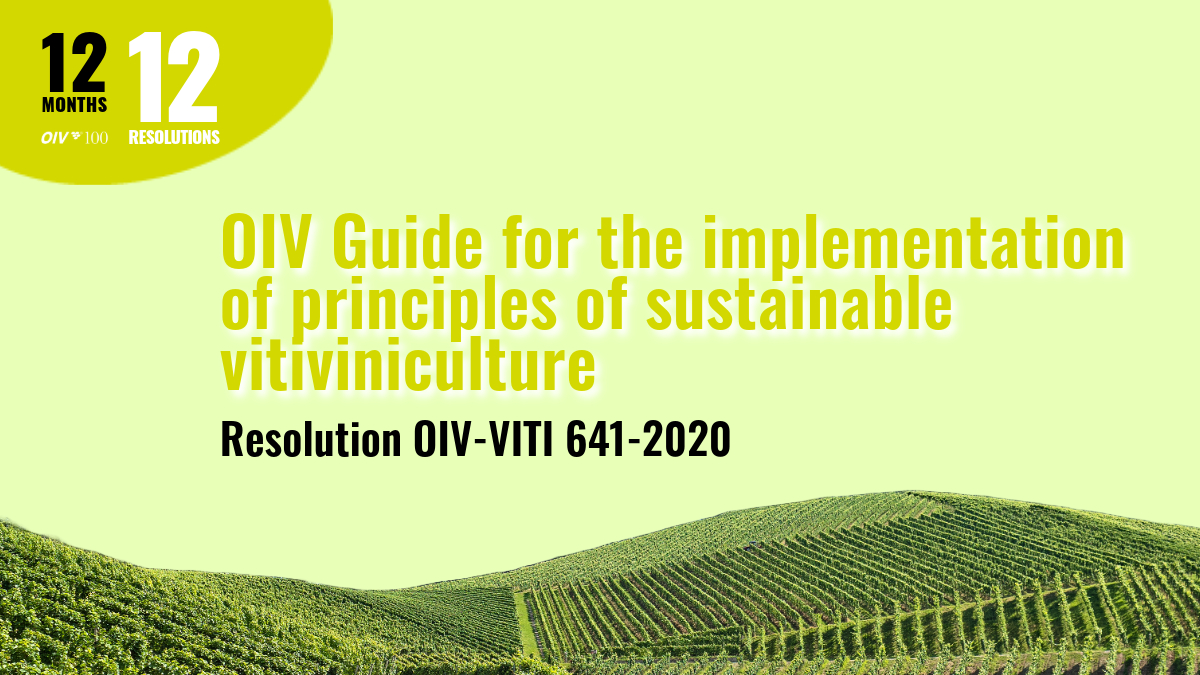The OIV has made sustainable development in the vitivinicultural sector a core mission. As part of this year's centenary series, "12 months, 12 resolutions," this month highlights Resolution OIV-VITI 641-2020: “OIV Guide for the implementation of principles of sustainable vitiviniculture.”


A long-standing focus in OIV works
The sustainable development of the vitivinicultural sector has been a key priority for the OIV, guiding its decision-making processes over the years. This focus has led to the creation of various standards, beginning with the definition of sustainability in Resolution CST 1/2003, and evolving to a more comprehensive review of environmental, social, economic, and cultural aspects in Resolution OIV-CST 518-2016.
In 2020, the 18th OIV General Assembly took a step forward by adopting the OIV Guide for the Implementation of Principles of Sustainable Vitiviniculture through Resolution OIV-VITI 641-2020. This standard serves as a practical guide for entities—whether individuals or groups—responsible for the production of grapes, wine, special wines, vitivinicultural spirits, grape juice, and nectar, helping them embrace and implement sustainability principles.
The OIV guide provides:
• General description of the management process for planning and implementing a sustainability approach within an organisation
• Recommendations for actions that could be undertaken by an organisation to contribute to sustainability outcomes
• Various planning and organisational tools
The reflexion pathway on sustainability at the OIV
By Prof. Hans Reiner Schultz, President of the SUSTAIN Expert Group
The vitivinicultural sector, as an international industry encompassing many climates, growing and production conditions, processing methods, packaging forms, distribution and marketing channels and in some areas being part of human history for several thousand years is an example for sustainability in terms of longevity but also in terms of the array of challenges, individual issues and subject fields.
As such, the sector needed and needs a practical guide to promote and apply the general principles of sustainability and the OIV is the International Organisation providing these guidelines.
Interest in sustainability has increased significantly in the wine sector in the past, driven by customer interest, as well as the impact of global warming-intensified weather extremes on wine growers. For a sustainable future the wine industry must design its entire value chain in such ways that it conserves and regenerates the natural environment and at the same time promotes human rights, inclusion and equality. In principle 5 key challenges need to be overcome in order to reach this goal and which have been incorporated over many years into various OIV resolutions:
1. Climate change impact and adaptation strategies,
2. the reduction of GHG (greenhouse gas) emissions and creation of carbon sinks,
3. vineyard inputs,
4. packaging and logistics and
5. social and economic sustainability.
The OIV guide in action: the Chilean vitivinicultural sector
By Patricio Parra, OIV Expert of the Chilean Delegation in the SUSTAIN Expert Group
The Resolution OIV-VITI 641-2020 is undoubtedly an important contribution of the OIV, with a clear vision for the implementation of the principles of sustainability in different organisations and countries that have not yet implemented specific programs in this area or that already have programs and wish to incorporate other dimensions. It has the value of not being limited to a general description of issues or requirements, but goes further, with implementation guidelines, practical recommendations and specific tools.
This work of the OIV is fully aligned with our vision of sustainability, considering together its three fundamental and indivisible dimensions (social, environmental and economic), but it also includes the cultural dimension. The most obvious example of this joint vision with the OIV is our Sustainability Code for the Chilean Wine Sector, which also takes a holistic view of the different areas of sustainability. Likewise, we have a common view on the positive effects of collaborative work between public and private organisations, on the dynamic concept of sustainability, on the need to incorporate innovation and the recognition of regional differences between regions and countries.
Sustainability in the vine and wine sector poses a global challenge, which we must face together and in a coordinated manner. This OIV document is aimed at this objective, establishing a clear path for the future and a practical guide for the application of fundamental principles of sustainable vitiviniculture in different wine-growing territories. It considers the environmental aspects, but also highlights the idea of shared value and the human dimension, including producers, workers, consumers and communities, without forgetting the economic sustainability.


